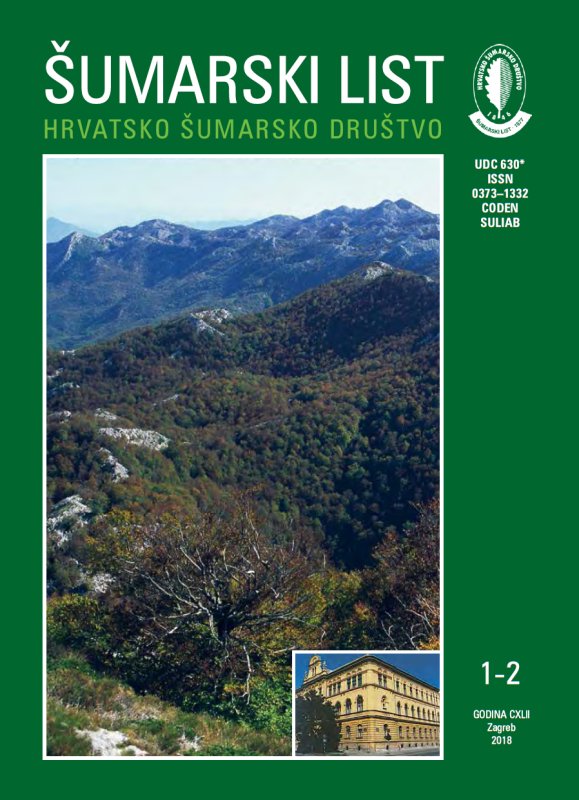
broj: 1-2/2018
pdf (4,94 MB) |
|
||||||||||||||
| RIJEČ UREDNIŠTVA | ||
| UREDNIŠTVO | ||
| IS THE FOREST ACT BINDING FOR ALL FOREST OWNERS? pdf HR EN | 5 | |
| IZVORNI ZNANSTVENI ČLANCI | ||
| Igor ANIĆ, Stjepan MIKAC, Mladen OGNJENOVIĆ | UDK 630* 568 + 815 (001) https://doi.org/10.31298/sl.142.1-2.1 | |
| SELECTION OF TREE SPECIES FOR THE SUBSTITUTION OF POPLAR PLANTATIONS ALONG THE RIVER DRAVA NEAR OSIJEK pdf HR EN | 7 | |
| Summary The paper presents the results of research on the survival and growth of several tree species which could be used to replace poplars in plantations if necessary. The experiment was established in the area of Valpovo Forest Office, in the Management Unit of Valpovačke Podravske Šume, forest area of Topolje, sub-compartment 23a. This locality is a typical example of poor growth and dieback of poplar plantations even after multiple restocking with poplar seedlings and tending. The experiment was set up according to the randomized block design, with six treatments in four blocks. The following stand forms were treated: A - pedunculate oak, B - narrow-leaved ash, C - black locust, D - pedunculate oak with common hornbeam, E - wild cherry with narrow-leaved ash, and F - wild cherry with common hornbeam. The experiment was established on November 18, 2000. Plant survival was recorded every year over a five-year trial monitoring period. During the winter of 2015, the height of all the trees was measured and the spatial position of live and dead individuals per subplot was determined. In terms of survival and height as indicators of plant growth and development, the best results were manifested by black locust, followed by narrow-leaved ash and pedunculate oak. The poorest results were achieved by wild cherry and common hornbeam. With regard to the micro-relief, the best survival was displayed by black locust, which grows equally well both in unsoaked micro depressions (niza) and on micro elevations (greda). Narrow-leaved ash and pedunculate oak survived better in micro-depressions. In general, wild cherry and common hornbeam showed poor survival irrespectively of the micro-relief. Research results confirm the hypothesis regarding the need to replace or substitute poplar plantations under changed site conditions towards a stand whose stand form is adequately suited to the terminal forest community of the study area - spreading elm and narrow-leaved ash with pedunculate oak (Fraxino-Ulmetum laevis Slavnić 1952). The procedure should be preceded by a detailed forest management plan which would, among other things, define the areas of micro-depressions and micro-elevations in a particular compartment. Micro-depressions and wet micro-elevations should be reserved for narrow-leaved ash, which showed very good results in the trial. Pedunculate oak displayed very good stability and vitality and should therefore be used in a mixture with narrow-leaved ash. Black locust proved to be suitable in all conditions, but it is recommended to use it over the driest and sandy soils which have abruptly remained without ground and floodwater. Key words: poplars; pedunculate oak; narrow-leaved ash; black locust; analysis of variance | ||
| Igor POLJAK, Marilena IDŽOJTIĆ, Irena ŠAPIĆ, Patrik KORIJAN, Joso VUKELIĆ | UDK 630* 181.8 + 164 (001) https://doi.org/10.31298/sl.142.1-2.2 | |
| DIVERSITY AND STRUCTURE OF CROATIAN CONTINENTAL AND ALPINE-DINARIC POPULATIONS OF GREY ALDER (Alnus incana /L./ Moench subsp. incana): ISOLATION BY DISTANCE AND ENVIRONMENT EXPLAINS PHENOTYPIC DIVERGENCE pdf HR EN | 19 | |
| Martin BOBINAC, Siniša ANDRAŠEV, Andrijana BAUER-ŽIVKOVIĆ, Nikola ŠUŠIĆ | UDK 630*242 (001) https://doi.org/10.31298/sl.142.1-2.3 | |
| EFFECTS OF HEAVY THINNINGS ON THE INCREMENT AND STABILITY OF A NORWAY SPRUCE STAND AND ITS TREES BETWEEN THE AGES OF 32 AND 50 pdf HR EN | 33 | |
| Bratislav MATOVIĆ, Miloš KOPRIVICA, Bratislav KISIN, Dejan STOJANOVIĆ, Igor KNEGINJIĆ, Stefan STJEPANOVIĆ | UDK* 228 + 653 (001) https://doi.org/10.31298/sl.142.1-2.4 | |
| COMPARISON OF STAND STRUCTURE IN MANAGED AND VIRGIN EUROPEAN BEECH FORESTS IN SERBIA pdf HR EN | 47 | |
| PRETHODNO PRIOPĆENJE | ||
| Milan PERNEK | UDK 630* 453 https://doi.org/10.31298/sl.142.1-2.5 | |
| NEW CALCULATION OF CRITICAL NUMBER OF GYPSY MOTH (Lymantria dispar L.) EGG MASSES FOR BETTER POPULATION DENSITY PROGNOSIS pdf HR EN | 59 | |
| Luka RUMORA, Mario Miler, Damir MEDAK | UDK 630* 587 https://doi.org/10.31298/sl.142.1-2.6 | |
| IMAGE FUSION INFLUENCE ON FOREST AREA CHANGE USING UNSUPERVISED CLASSIFICATION pdf HR EN | 67 | |
| PREGLEDNI ČLANCI | ||
| Carlos G. ROSSA, Paulo M. FERNANDES | UDK 630* 148.2 + 111.8 https://doi.org/10.31298/sl.142.1-2.7 | |
| ON THE FIRE-SPREAD RATE INFLUENCE OF SOME FUEL BED PARAMETERS DERIVED FROM ROTHERMEL’S MODEL THERMAL ENERGY BALANCE pdf HR EN | 77 | |


